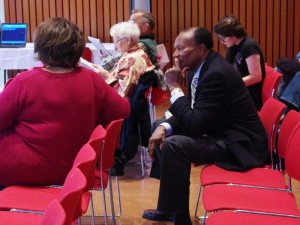Bass-Baritone Simon Estes spoke this Thursday at Convocation on “Voice, Values and Vision,” following a performance to a packed audience in Herrick Chapel Wednesday night. World-renowned as one of the first generations of leading African-American male opera singers to help break down racial barriers and prejudices in the opera world, he retired from Boston University two years ago to return to his native Iowa to Wartburg College in Waverly, less than 200 miles from his hometown of Centerville.

Currently, Estes is performing in all 99 Iowa counties as part of his “Roots and Wings” tour, which is dedicated to setting up a system for young Iowa musicians to be able to perform and make a living where they were educated. The tour’s name comes from Estes’ roots in Iowa and his desire that by helping musicians build their reputation and visibility within the community, he can give them wings to success.
“Music is one of the greatest avenues that has helped bring all of us together,” said Estes during his Convocation.
By performing with young musicians in each county throughout the state, Estes is hoping that people, on seeing the amount of local musical talent in their area, will choose to support young people’s careers and attend their concerts, often at about the same price as a movie ticket.
The proceeds from his “Roots and Wings” tour are being used to fund scholarships for high school graduates who might otherwise not be able to attend college or university. In the past year and a half, he has funded 53 scholarships for young people across Iowa.
The subject of his Scholar’s Convocation speech was his life and the path he travelled from Iowa to performing for six presidents at the White House and playing 102 different operatic roles, frequently referencing the role of faith and God in supporting him and gifting him with musical talent over a long and successful career.
“I’ve sung in all the major opera house in the world,” Estes said, “And it has been an incredibly humbling and educational experience to travel around the world and meet people that live in all of these countries.”
Estes himself comes from very humble roots. Born in Centerville, Iowa in 1938, Estes’ father was illiterate and his grandfather had been a slave sold for $500. He attended the University of Iowa, intending to study medicine, but after changing his major a number of times, switched to vocal music after being discovered in the “Old Gold Singers” by Charles Kellis and introduced to classical music and opera.
Kellis arranged an audition at the Juilliard School of Music for Estes, who at the time knew almost nothing about the prestigious school. “As I look back on it, I’m really grateful I came from this humble family,” Estes said, “I was so naïve I didn’t have enough sense or maybe knowledge to be nervous [about Juilliard].”
His audition went well and he received a full-ride, but left the school when he received an invitation from the Deutsche Oper to perform in Aida as the King. When he arrived, he was told to perform the role of Ramfis instead, which he learned and memorized in 12 days.
Since then, he has only become more and more successful, performing as the first black male at Bayreuth and as Porgy in the Metropolitan Opera’s debut performance of Porgy and Bess, fifty years after it was first performed.
Throughout his convocation speech, Estes pushed the importance of education. Despite his father’s illiteracy, he pushed Estes to value education more than almost anything else. In his speech Estes pointed out the necessity of “nourishing” both our bodies and minds and the role education played in his life.
Now, Estes helps provide educational opportunities to others through the Simon Estes Scholarship Fund at the University of Iowa, the Simon and Westella H. Estes Scholarship Fund at Centerville Community College, the Simon Estes Educational Foundation, The Simon Estes International Foundation, the Simon Estes Foundation in Cape Town, and the Simon Estes Iowa Educational Foundation.
Despite his success in numerous roles, Estes’ performance on Wednesday demonstrated how firmly rooted he is in his identity as a the grandson of a slave, a devout Christian and an African American, with performances of spirituals like Nobody Knows The Troubles I’ve Seen, religious songs like The Lord’s Prayer and a piece from Porgy and Bess.
The Simon Estes concert in Herrick Chapel included both Estes and Kenton Jordan, a young musician from Drake University, singing opera. Pianist Jodi Goble accompanied them. Additionally, the Combined Choirs of the Grinnell Singers and Grinnell Oratorio Society and the Grinnell High School Concert Choir performed two songs near the beginning and worked with Estes for the finale, Battle Hymn of the Republic.




















































tnwoman1948 • Nov 24, 2011 at 7:50 am
May God continue to bless this accomplished man. He should to be greatly admired as a badly needed role model especially for young black American males.